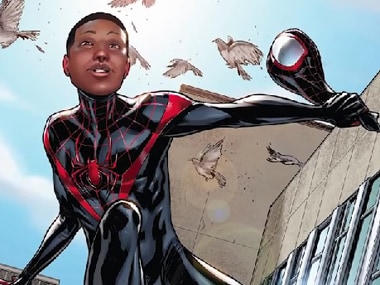In 1976, Alex Haley, an African American wrote a path breaking book, ‘Roots: The Saga of an American Family’. Roots celebrated the ‘origins of the main protagonist- Kunta Kinte - a black man who was sold into slavery and found himself on American shores. Since then and even prior to that , a person’s ‘roots’ were held to be a determining and structural and indelible aspect of his or her personality. This pertained to so called organic nationalism and the nation state. The former held that identity was ascriptive and immutable and the latter gave it a territorial form and shape. [caption id=“attachment_2307110” align=“alignleft” width=“380”]  Miles Morales as Spider- Man. YouTube screengrab[/caption] Both were and are constructs as a wonderful book titled , ‘The Global Me: New Cosmopolitans and the Competitive Edge: Picking Globalism’s Winners and Loser’ asserted. I picked up the book from a Brisbane bookshop in Australia as the new millennium was about to dawn. Even though the book, written by Wall Street Journal correspondent, Pascal Zachary, was more in the nature of a prescription for business and policy makers and I read it when my own sense of self and identity was inchoate and under tremendous stress, I found the book to be insightful and prescient; far ahead of its times. Pascal posited that the shifts in the global economy, migration patterns were leading to paradigm shifts for both collectivities like states and individuals. The fluidity that defined both entailed that individuals had both ‘roots’ and ‘wings and according to the author, the new buzzword in the coming times would be mongrels and mongrelisation. The mongrelisation process meant and entailed certain fluidity. According to the author,’ Now people increasingly construct themselves, piecing their identity together from diverse experiences, relying on not only their own kind but also their knowledge of the wider world, their tastes and inclinations and their belief in what works for them’. There is an element of freedom about and over the mongrelisation process; individuals can increasingly define themselves than being told who they are or can be. The hypothesis advanced by Pascal was prescient and in a putative form but the world is increasingly( albeit hesitantly moving in this direction). This is eloquently revealed and reflected by Spider Man’s new avatar. Spider Man, hitherto represented by a white , male, Peter Parker, is all set to be replaced by a multi racial teenager, Miles Morales- the offspring of an African American father and a Peurto Rican mother. For all intents and purposes, Miles Morales is a mongrel. This is a significant development: when stuff like this appears and happens in the public and popular sphere, it means , among other things, and to a large extent , that there is public acceptability or new paradigms, themes, and identities. And given that the appeal of Spider Man is to younger minds, this constitutes a formative experience for many in terms of representations of reality. This then is a very welcome development. Difference-the germ of many conflicts and issues- becomes the new normal and conflicts arising from different and differing identities collapse into a mongrelisation process. I am, in some senses , a product of this process. Even though my lineage is Kashmiri but I got educated in three continents: Asia, Australia and Europe. My primary identity is Kashmiri but my tertiary identity is more cosmopolitan: there’s a wee bit of an Australian in me; a European introvertedness coupled with a predilection for Europe’s social model and an admiration for aspects of the United States- especially its civic nationalism. I then am of the world and my self to a large extent corresponds to the Global Me. There’s hundreds and thousands like me. Miles Morales then reflects the fundamental reality of our world. But a caveat is on order here: Miles Morales can be Spider Man only in the United States- a veritable immigrant nation and a melting pot. In Europe, Miles Morales would not be accepted and perhaps even be scandalous. But the trend in what an American political scientist, called a fragmegratory world( a coinage accruing from fragmentation and integration) , seems to move towards synthesis and fluidity. The world is on the cusp of far reaching and wide change. Roots are giving way to wings or more accurately roots are complementing wings. This is a welcome development. Nations and individuals who resist this may be on the wrong side of history. Prudence dictates that the signs on the wall be read and a more integrated and wholesome paradigm in terms of identities be adopted by both states and individuals to negotiate in an increasingly complex world. Miles Morales represents this complex reality in a wonderfully eloquent way. Aloha, Miles Morales.
Miles Morales then reflects the fundamental reality of our world. But a caveat is on order here: Miles Morales can be Spider Man only in the United States- a veritable immigrant nation and a melting pot.
Advertisement
End of Article


)
)
)
)
)
)
)
)
)



